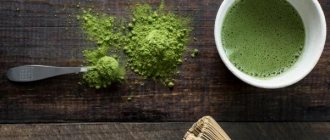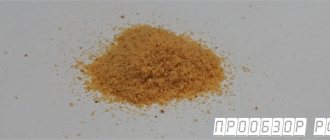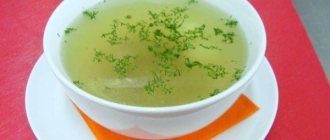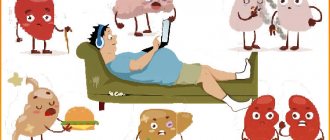Eating less doesn't mean starving
Eating less does not mean not eating at all. Going hungry is almost always a guarantee of eating a lot more in the near future. After several days, a breakdown occurs, which is scientifically called “post-starvation hyperphagia.” Hunger is the main reason why people lack willpower and why they quit dieting.
The body does not like change. It strives to maintain homeostasis or constancy of the internal environment. When you go on a starvation diet, your body turns on your hunger at full capacity and makes you sleepy and weak in order to save energy and replenish losses. You cannot control this process because it is controlled by hormones.
About fifteen hormones are responsible for hunger, the main ones being leptin, ghrelin and neuropeptide Y. They are secreted in different parts of the body, but all affect the brain.
Leptin is produced by fat cells. It tells your brain how much fat (stored energy) you have in your body, as well as how many calories you are taking in. When you are on a fasting diet, leptin levels drop and satiety signals do not reach the brain. In response to this, the brain “turns on” the feeling of hunger in order to escape death from starvation (,). When you eat a lot of calories, enough leptin is produced and it reduces hunger. In addition to hunger, leptin also affects overall metabolism by reducing the production of thyroid hormones ().
Ghrelin is a hunger hormone. It is produced in the stomach when it is empty (). Leptin and ghrelin are in an inverse relationship with each other. When leptin drops on a diet, ghrelin rises. When there is more leptin, there is less ghrelin (). Therefore, a fasting diet is a double blow in terms of hunger.
Neuropeptide Y. One of the tasks of this hormone is to delay the feeling of fullness during meals ().
If you've ever experienced the effects of starvation diets followed by weight loss and weight gain, an imbalance of these hormones most likely played a role (). When we get hungrier, we eat more. When we eat more, we gain the weight back.
Natural remedies and teas to reduce appetite
In addition to products, there is a large selection of natural remedies that can reduce appetite:
- Green tea. Contains caffeine and polyphenols, which increase metabolism and stimulate the breakdown of fats.
- Paraguayan mate. To get a boost of energy and suppress appetite, drink it cold or warm (up to +60 degrees).
- Sage decoction. The bitter aftertaste will help you give up sweets.
- Rosehip decoction. Contains a lot of tannins and up to 900 mg of vitamin C, while lemon contains only 40 mg.
Be sure to read: 8 secrets on how to set yourself up for a diet and not fail: cool motivation!
You can use flax seeds, corn silk, and horsetail.
Junk food makes you eat more
The quality of food directly affects the number of calories you receive. By “bad” food we mean burgers, desserts, chips, soda, sausages, pizza and the like with a lot of fat, sugar or salt. Unfortunately, the more “bad” food in your diet, the more and more often you want to eat it.
The human brain contains key goals - survival and reproduction. To reward us when we do things that help us survive, the brain has a reward system built into it. In nature, pleasant = useful, and the brain motivates with pleasure. When an action meets these global goals, the brain releases the hormone dopamine, which is responsible for positive reinforcement and motivation to seek repetition of what brought pleasure.
High-calorie food also gives you pleasure and makes you want to eat more of it. When receptors in the mouth and small intestine detect glucose, fructose, fatty acids, and protein amino acids, they send a signal to the brain and dopamine is released in response. And the more glucose and fats in food, the greater the surge of dopamine occurs and the more pleasure we experience from food (, 11,).
This mechanism forced our ancestors to strive for high-calorie (energy-rich) food, which was a good survival mechanism in difficult times. And for this, the brain rewarded with pleasure and motivation to look for it again. Today we still have the survival mechanisms of our ancestors, but we no longer need to look for high-calorie food, it is always nearby and in abundance.
Slow down
It is a known fact that it takes up to 20 minutes for the human brain to realize that he is full. Eating in a hurry will cause you to immediately reach for more.
- Take small bites and chew it 5-6 times.
- Swallow and only then decide whether you need a supplement. Eating on a schedule will allow you to spend more time eating.
- Also try to avoid unnecessary distractions like TV, and don't eat on the run! All this disconnects from the signals that the body sends and leads to overeating.
- Eating slowly also improves your digestive system because it gives your stomach more time to digest it.
- Try to chew slowly, focusing on the taste of the food.
No - sweet drinks
“Liquid” calories are the most invisible. Soda, juices, cocktails based on fruit or coffee, and even seemingly harmless country compote - all this brings a lot of calories due to sugar, but does not make you full.
Appetite is controlled by the brain, and some studies show that it does not “register” calories from liquid sugar in the same way as “solid” ones () and does not include a feeling of fullness as after a regular meal (). So sugary drinks don't fill you up, but they increase your thirst, making you drink more and more. This quietly increases your calorie intake throughout the day, often leading to weight gain.
Eat from small plates
Studies have shown that such manipulation tricks the brain into thinking that we have eaten enough. And with a deep plate there is a risk of eating more and underestimating the number of calories consumed.
So it makes sense:
- Save the large dining ones for special occasions.
- For regular meals, use salad or small dessert plates.
- The same principle can be used for drinks. Choose a tall, thin glass instead of a short, wide one. This habit will force the brain to expect small portions.
Amount of food and amount of calories are not always the same thing
Many people take the phrase “you need to eat less” literally, although it’s not so much about the volume or weight of food, but about how many calories it brings. A big plate of salad is “a lot of food.” Eclair means “little food.” It turns out that you can eat little food in volume, but a lot in calories and vice versa.
There is a concept called energy density. It shows the ratio of calories to the weight of the product. Water is a champion in this regard: it has zero calories at any weight. Fiber also comes close: 2 calories per gram. Fat is the champion on the opposite side, with a whopping 9 calories per gram. A glass of olive oil equals weight maintenance calories for the average woman. To gain the same 1800 calories from vegetables, you need to eat several kilograms. Therefore, very often, after going on a diet, people note that they begin to eat more, but lose weight.
So, thanks to the large amount of water, fiber and the absence of fat, vegetables bring few calories to the body, but are well saturated. Insoluble fiber increases the volume of the food bolus in the stomach, and stomach fullness is one of the important signals of satiety. This helps control body weight and diet: we get fewer calories, but remain full for a long time, do not experience acute hunger and do not lapse into high-calorie foods (,).
Drink more
Keeping your body hydrated will help you avoid eating when you're not actually hungry, because it's easy to confuse hunger with thirst.
Water is one of the few foods that you can enjoy as much as you want without any negative consequences. This is why it is very important to always keep enough water on hand. This way, you will prevent dehydration, maintain high energy levels and control hunger.
- If your stomach is already rumbling, and lunch is still far away, then you should first drink a glass of water or a cup of broth or vegetable soup.
- Try other drinks: unsweetened coffee or tea, water with lemon, or a glass of skim milk.
Water diet for the lazy
A water diet for the lazy sounds quite strange at first glance. Struggling with problems...
The labels “healthy lifestyle”, “for weight loss”, “weight control” - do not mean anything
Even if a food is marketed as healthy, it may still contain a lot of calories. Healthy lifestyle and everything that claims to be like it may have a better composition (although not always), but the calories don’t disappear anywhere. Here's a comparison of a roll from one of the health food chains and a cheeseburger from McDonald's:
Healthy lifestyle products can lead to unconscious overeating. “Low fat” labels do not mean that the product is low in calories, although that is what we perceive it to be.
Participants in one study were given muesli that was labeled "low-fat." They ended up eating 49% more than those who ate plain, unlabeled muesli, knowing it was a calorie-dense food they'd better not indulge in (). There is also a study that showed that in a supposedly healthy fast food chain, people eat 34% more calories than they thought. While at McDonald's it is +25% (). They considered the exact same food in “healthy” fast food to be lower in calories. Moreover, “healthy” fast food customers tended to reward themselves for their healthy lifestyle by ordering extra chips or cookies.
This tendency to unconsciously overeat foods perceived to be healthier is known as the “health halo effect,” which is well known to marketers who increase sales simply by labeling them gluten-free, low-fat, or organic. etc. So choose products based on their ingredients rather than the health promise on the label.
How to keep track of your portion sizes?
Huge portions have become a problem in modern society, which is worsening literally before our eyes, especially given the fact that our physical activity is simultaneously declining.
We move less than our grandparents and eat more. Often the culprit is too large portions. In stores, we are tempted with “Buy one, get one free” promotions, literally pushing unhealthy foods high in salt, sugar and fat onto customers. In such conditions, it is easier to easily acquire the habit of overeating.
How to train yourself to eat less: 10 tips
- Use smaller plates.
- Place as much food on your plate as will fit in your cupped palms.
- When sitting down at the table, turn off the TV and put the book aside. Distractions make it difficult for us to focus on food, causing us to eat more than we need.
- Eat slowly and chew each bite thoroughly. Enjoy your meal.
- After each bite, place your knife and fork on the table.
- Don't rush to take a supplement. Wait about ten minutes. Well, it seems that you don’t want to eat anymore... Remember that the body needs time to feel full.
- After setting the table, put the remaining food away from temptation.
- Wash your food down with water.
- Share a restaurant portion between two people (and save money at the same time) or order a smaller portion.
- Keep track of what you eat in your diary.
Natural sweets do not become dietary
It is a well-known mistake to consider natural foods to be dietary and low-calorie. There is nothing wrong with natural sweets, but this is not permission to eat them uncontrollably.
Honey. A person gives up sugar, but adds “healthy and natural” honey to his morning porridge, but in three times more quantity. Sugar has 380 calories and honey has 320. Mixed nuts are considered a “healthy snack,” and they are. But if you look at the label, they turn out to be just as high in calories: 100 grams of nuts contain 500 calories. And this is a very compact handful, which is usually not limited to. Muesli bars and loose muesli. Thanks to marketers, high-calorie foods are now called “energy foods.” Who doesn't want energy? “Get your energy for the day” sounds a lot better than “eat half your calories first thing in the morning.” Dried fruits are healthy, but incredibly high in calories. Dates have about 300 calories per 100 grams, which is just a small handful. Fresh fruits contain a lot of water, and it is very difficult to eat a kilogram of apricots, but nothing in the form of dried apricots. Essentially, dried fruits are just candies with a little fiber and vitamins. This comes back to the issue of energy density: small volume, high calories. PP cakes, where all the usual ingredients are replaced with natural ones: instead of buttercream - peanut butter, dates, coconut oil, bananas. Instead of white flour, use any other flour: with bran, gluten-free, almond or buckwheat. It's much healthier than refined sugar and margarine, but the calories are the same.
A natural product does not mean that it is “dietary”. Although that's exactly what it seems like. Therefore, it is important to separate calories from naturalness and benefits. These are different planes.
Dinner can be filling
Many people still have the idea that breakfast gives you energy for the day and should be the most high-calorie breakfast. They say that this is a marketing ploy by manufacturers of cereals or corn flakes from the 40s of the last century. In any case, even the most satisfying breakfast will charge you with energy for a maximum of 3-4 hours. If you move most of your food to the first half of the day, it will be difficult to fight evening hunger. And it will definitely come, because it is impossible to eat enough once and for the whole day, no matter how much you eat.
The “no food after X hours” diet may not suit everyone, because everyone has their own lifestyle, daily routine and activity level. Choosing the frequency of meals and the distribution of foods throughout the day should be realistic and convenient for you. For some, shifting most of your calories to the evening may be more effective for weight loss.
- Firstly, it's a full dinner with the family.
- Secondly, many people work during the day and forget/don’t have time to eat properly, so they tolerate hunger more easily. It’s easier for them to distract themselves from thoughts about food while they’re doing something. In the evening, when work is over and a person is left to his own devices, it is very difficult to refuse food - the refrigerator beckons and nothing distracts from thoughts of hunger. Many people go in circles: the ideal healthy lifestyle in the first half of the day and hungry breakdowns for junk food before bed.
- Thirdly, a sufficient amount of carbohydrates in the last meal helps you fall asleep faster (and there are often problems with falling asleep on a diet due to feelings of hunger).
Tips on how to stop eating too much and lose weight
An irresistible desire to eat something does not necessarily indicate true hunger ; it “speaks” of a conditioned reflex.
If a person is used to eating while sitting in front of the TV, it means that the next time he watches his favorite program, the body will want to be satiated. There are a number of techniques for stopping overeating.
Good motivation
When you eat certain foods, your brain receives signals that simple carbohydrates in the form of sugar and fatty foods are tastier than fresh vegetables.
An irresistible desire to eat something does not necessarily indicate true hunger.
But the mind is able to influence the brain, and if you understand that this is harmful or will not lead to the desired result, then it will be easier to give up fats and sweets.
Important! A person eats in order to live, and does not live in order to eat. Understanding the meaning of this phrase will help you psychologically tune in to changing your diet.
If the problem is excess weight, then even after a slight reduction (just a few kilograms), motivation will disappear.
Considering weight loss as the ultimate goal means making a big mistake: it is a fight against the effect, but not against the cause in the form of eating habits. It is important not just to go on a diet, but to make a new way of eating the norm.
Weight loss:
- will ease the load on internal organs and lower limbs;
- improves the condition of skin and hair;
- will raise self-esteem.
Be sure to read: How to cure anorexia: medication and alternative treatment, therapy during pregnancy, prevention
These are important incentives that should not be neglected.
As a motivation, you can choose: a toned figure, a chance to find your soul mate faster, increased libido, etc.
To avoid breakdowns, pictures of coastal countries where you want to go next summer or keeping a diary with weekly results will help.
Lifestyle change
As a motivation, you can choose: a toned figure, a chance to quickly find a soul mate, increased libido, etc.
If you want to switch to a new diet with a certain calorie content, you should avoid feeling hungry, because a person in this state eats 3 times more than he needs for food. saturation.
Besides:
- There is no need to step on the scale every day; it is better to do it weekly, when the result is noticeable.
- It is not necessary to prepare separate low-calorie foods, just reduce the amount.
- The first two weeks you need to count calories until you develop a specific menu.
- Fresh sauerkraut should always be present on the table in case of a sudden desire to eat (contains 20 kcal and cleanses the intestines well).
- Before you open the refrigerator, you need to think about what to take.
- After eating food of the required calorie content, you should wait 15-20 minutes until you feel full.
- It is better not to drink food while eating.
- Before going to bed, be sure to consume 50 kcal (a glass of low-fat kefir, half a glass of fruit juice, half an apple).
The daily kcal norm is: 1200 kcal in the absence of physical activity, 1500 - with moderate and 1800 - with significant exercise for men.
Changing eating habits
You can start restricting by replacing sweet yoghurts with low-fat kefir, juices and soda with mineral water, cakes with fresh fruit, etc.
For those who are prone to gluttony, purchasing food and cooking can become a kind of hobby or profession. This kind of addiction to food is not considered as bad as alcoholism or drug addiction.
But you should realize that the ways of their formation are the same - getting pleasure. In the case of food, satisfying physiological needs is enough. To get rid of food addiction, it makes sense to change your priorities.
To change eating habits, they need to be identified. During the week, you should write down everything that was eaten, at what time and why (boredom, fatigue, hunger, anger, etc.).
Then analyze the data obtained and decide what needs to be changed first.
You need to move towards your goal step by step, without trying to change everything suddenly. You can start restricting by replacing sweet yoghurts with low-fat kefir, juices and soda with mineral water, cakes with fresh fruit, etc.
When some habits have been overcome, they move on to the next.
Blood Sugar Level
The level in a healthy person does not exceed 5.6 mmol/l. With excess body weight it is usually higher and if it lasts for a long time, then they talk about prediabetes or diabetes.
During weight loss, the sugar level should decrease, gradually returning to normal. When consuming sweets, you should increase physical activity, normalizing glucose levels.
Be sure to read: Proper diet: how many times a day should you eat to lose weight
Proper diet
If the new diet is designed for a long time or becomes the norm for the rest of life, then it must be balanced and include all the necessary micro- and macroelements, vitamins, in contrast to various short-term diets.
It should be noted that the portion and number of calories will be smaller, while the ratio of proteins, fats and carbohydrates should remain unchanged. If a person has intellectual work, there should be 2/1/2, if heavy physical work - 2/2/5.
Advice! So that there is not enough food, you need to replace the regular plate with a saucer or small bowl.
Power supply schemes are presented in the table:
| Eating | Option No. 1 (kcal) | Option No. 2 (kcal) | Option No. 3 (kcal) |
| Breakfast No. 1 (7.00-9.00) | 100 | 100 | 200 |
| Breakfast No. 2 (9.00-11.00) | 250 | 300 | 400 |
| Snack (11.00-13.00) | 50 | 100 | 100 |
| Lunch (13.00-15.00) | 350 | 450 | 600 |
| Snack (15.00-17.00) | 50 | 50 | 50 |
| Dinner (17.00-19.00) | 350 | 450 | 450 |
| Overnight (21.00-23.00) | 50 | 50 | 50 |
| Total | 1200 | 1500 | 1800 |
A similar table of caloric content of dishes should be attached with magnets to the refrigerator so that you can always see it. After 1-2 weeks, the information will be remembered, and things will be more fun. This diet allows you to lose weight by 2-3 kg per week.
An approximate one-day menu for option 1 is presented in the table below:
| Eating | Calorie content (kcal) | Products |
| Breakfast No. 1 | 100 | 100 g low-fat cottage cheese + 1 tsp. low-fat sour cream + unsweetened tea |
| Breakfast No. 2 | 250 | 2 eggs + cheese sandwich + unsweetened tea with lemon |
| Snack | 50 | Orange |
| Dinner | 350 | 75 g stewed beef + 150 g stewed vegetables + slice of bread + 1 small cucumber + unsweetened coffee |
| Snack | 50 | A glass of freshly squeezed juice |
| Dinner | 350 | 150 g baked pink salmon + 100 g boiled potatoes + 1 slice of bread + 100 sauerkraut + unsweetened tea |
| For the night | 50 | A glass of low-fat kefir |
The main thing is not to skip meal times. If you missed a snack, 50 kcal should be added to lunch or dinner.
Buy products according to the list
Firstly, you shouldn’t go to the store hungry; secondly, do not buy high-calorie foods, succumbing to momentary weakness.
You should make a list based on the dishes you plan to cook during the week.
Considering that the menu should be varied and balanced, you need to include:
- meat;
- chicken;
- fish;
- cereals for making porridge;
- egg;
- low-fat milk;
- fruits for snacks;
- vegetables for salads, stewing;
- whole wheat bread;
- Tea coffee;
- Semi-finished products are acceptable.
The process of compiling a menu and grocery list takes little time, but will save you from a lot of thinking about what to cook.










